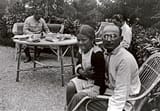Search Results
6/28/2025, 7:14:25 PM
>>17798398
>During the postwar years, Beria supervised the successful establishment of Communist regimes in the countries of Eastern Europe, usually by coup d'etat, and hand-picked the leaders. A substantial number of these leaders were Jews, which drew the attention of Stalin. Starting in 1948, Abakumov initiated several investigations against these leaders, which culminated with the arrest in November 1951 of Rudolf Slánský, Bedřich Geminder, and others in Czechoslovakia. These men were generally accused of Zionism and cosmopolitanism, but, more specifically, of providing weapons to Israel. Beria was deeply disturbed by these charges, as large amounts of Czech arms had been sold to Israel on his direct orders. Beria wanted an alliance with Israel to advance the communist cause in the Middle East, while later Soviet leaders chose instead to form a powerful alliance with countries in the Arab World. Altogether, 14 Czechoslovak Communist leaders, 11 of them Jewish, were tried, convicted, and executed (see Slánský trial). Similar investigations in Poland and other Soviet satellite countries occurred at the same time
>Between June 1947 and October 31, 1949, the Jewish agency (later to become the Israeli government) seeking weapons for Operation Balak, made several purchases of weapons in Czechoslovakia, some of them of former German army weapons, captured by the Czechoslovak army on its national territory, or newly produced German weapons from Czechoslovakia's post-war production. In this deal, sale activities of Czechoslovak arms factories were coordinated by a special-purpose department of the Československé závody strojírenské a kovodělné, n.p. (Czechoslovak Metal-Working and Engineering Works, Nat.Ent.) Holding, called Sekretariát D (Secretariat D), headed by Gen. Jan Heřman (ret.)
>The deliveries from Czechoslovakia proved important for the establishment of Israel
>During the postwar years, Beria supervised the successful establishment of Communist regimes in the countries of Eastern Europe, usually by coup d'etat, and hand-picked the leaders. A substantial number of these leaders were Jews, which drew the attention of Stalin. Starting in 1948, Abakumov initiated several investigations against these leaders, which culminated with the arrest in November 1951 of Rudolf Slánský, Bedřich Geminder, and others in Czechoslovakia. These men were generally accused of Zionism and cosmopolitanism, but, more specifically, of providing weapons to Israel. Beria was deeply disturbed by these charges, as large amounts of Czech arms had been sold to Israel on his direct orders. Beria wanted an alliance with Israel to advance the communist cause in the Middle East, while later Soviet leaders chose instead to form a powerful alliance with countries in the Arab World. Altogether, 14 Czechoslovak Communist leaders, 11 of them Jewish, were tried, convicted, and executed (see Slánský trial). Similar investigations in Poland and other Soviet satellite countries occurred at the same time
>Between June 1947 and October 31, 1949, the Jewish agency (later to become the Israeli government) seeking weapons for Operation Balak, made several purchases of weapons in Czechoslovakia, some of them of former German army weapons, captured by the Czechoslovak army on its national territory, or newly produced German weapons from Czechoslovakia's post-war production. In this deal, sale activities of Czechoslovak arms factories were coordinated by a special-purpose department of the Československé závody strojírenské a kovodělné, n.p. (Czechoslovak Metal-Working and Engineering Works, Nat.Ent.) Holding, called Sekretariát D (Secretariat D), headed by Gen. Jan Heřman (ret.)
>The deliveries from Czechoslovakia proved important for the establishment of Israel
Page 1
